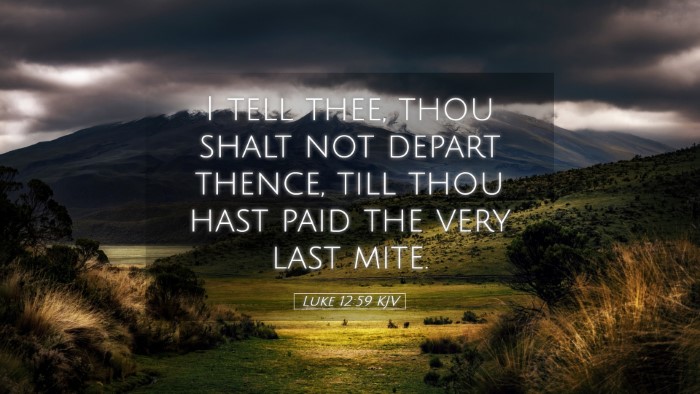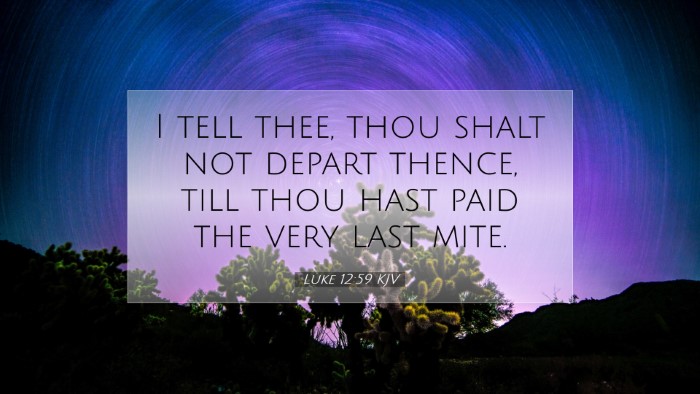Commentary on Luke 12:59
Luke 12:59 (KJV): “I tell thee, thou shalt not depart thence, till thou hast paid the very last mite.”
Introduction
This verse, embedded within a parable about the inevitability of judgment and the cost of sin, expresses profound theological implications regarding human accountability before God. The teachings from this verse offer valuable insights into the nature of divine justice and the need for reconciliation.
Context of the Passage
To fully grasp the significance of Luke 12:59, one must consider its broader context. In Luke 12, Jesus teaches about the impacts of material possessions, the importance of vigilance, and the consequences of one's actions. He uses the metaphor of a debtor in a litigation scenario to illustrate the urgency of making peace before facing judgment.
Insights from Matthew Henry
Matthew Henry emphasizes the seriousness of the obligation to settle one's debts, both material and spiritual. According to Henry, the phrase "thou shalt not depart thence" serves as a stark reminder that unresolved issues—especially those concerning sin—will require resolution before entering into eternal bliss. He underscores the idea that failing to reconcile with God leaves one outside the realm of divine favor.
- Divine Justice: God’s justice cannot be overlooked. The idea of paying "the very last mite" reinforces that every debt, no matter how small, must eventually be addressed.
- Call to Reconciliation: Henry highlights the need for sinners to seek reconciliation with God before it is too late. The metaphor underscores that procrastination in addressing one’s sins can lead to dire spiritual consequences.
Insights from Albert Barnes
Albert Barnes interprets this verse as Christ's warning against the consequences of delaying reconciliation with God. Barnes points out that the metaphor signifies the payment of one’s debts due to sin, suggesting that humans are accountable for their actions, and failure to address them leads to inevitable consequences.
- Urgency of Repentance: Barnes suggests that the need for immediate repentance is paramount. One must not wait until the last moment, as procrastination could lead to eternal separation from God.
- Illustration of the Court: By illustrating a court setting, Barnes expands upon the idea that just as earthly courts demand full restitution, so does God's justice concerning sin.
Insights from Adam Clarke
Adam Clarke addresses the cultural implications of the text. He notes that the "mite" signifies the smallest denomination of currency, symbolizing that even the least transgressions are of consequence in the eyes of God. Clarke implies that God is meticulous about justice, and every unaddressed issue must be rectified.
- Meticulous Nature of God’s Justice: Clarke states that God's justice is precise, not dismissing even the seemingly insignificant faults.
- Spiritual Implications: He stresses a profound need for believers to carefully examine their lives and focus on rectifying their personal sin before the final judgment.
Theological Implications
This verse carries significant theological implications concerning God's justice and human accountability. The assurance that every sin and debt will be paid, generates a sense of urgency among believers to seek repentance and reconciliation.
The notion that one will not "depart thence" until every last debt is settled suggests a state of moral and spiritual imprisonment for those who live in unrepentant sin. It serves as a powerful reminder of the necessity of atonement.
Practical Applications
The teachings from Luke 12:59 resonate with practical applications for contemporary believers:
- Emphasis on Repentance: The urgency of seeking reconciliation with God should be a cornerstone of every believer's life. Regular confession and contrition before God are essential.
- Awareness of Sin's Consequence: Developing a keen awareness of the implications of sin can motivate one to avoid compromising situations.
- Active Pursuit of Righteousness: Believers are called to live lives that reflect the grace received through repentance and faith.
Conclusion
Luke 12:59 serves as a potent reminder of the urgency of addressing one's sins before God. The insights gleaned from Matthew Henry, Albert Barnes, and Adam Clarke combine to provide a well-rounded understanding of divine justice and accountability. For pastors, students, and theologians, this passage challenges believers to pursue active reconciliation with God, ensuring that they do not delay in settling their spiritual debts.
As we contemplate these teachings, let us strive to live in a manner that honors God’s righteousness, taking heed of the profound implications of this verse.


